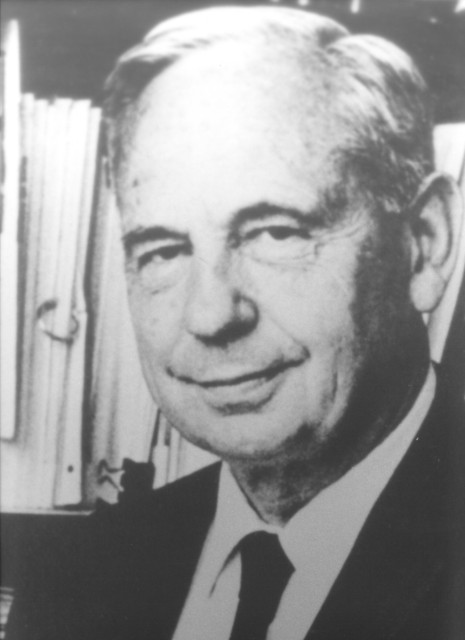<Back to Index>
- Chemist Henry Eyring, 1901
- Painter Jan de Baen, 1633
- 1st President of Egypt Muhammad Naguib, 1901
PAGE SPONSOR

Henry Eyring (born February 20, 1901 in Colonia Juárez, Chihuahua – December 26, 1981 in Salt Lake City, Utah) was a Mexican born American theoretical chemist whose primary contribution was in the study of chemical reaction rates and intermediates.
A
prolific writer, he authored more than 600 scientific articles, ten
scientific books, and a few books on the subject of science and
religion. He received the Wolf Prize in Chemistry in 1980 and the National Medal of Science in 1966 for developing the Absolute Rate Theory or Transition state theory of
chemical reactions, one of the most important developments of
20th century chemistry. Several other chemists later received the Nobel
prize for work based on it, and his failure to receive the Nobel prize
was a matter of surprise to many. The Royal Swedish Academy of Sciences apparently did not understand Eyring's theory until it was too late to award him the Nobel; the academy awarded him the Berzelius Medal in 1977 as partial compensation. He was also elected president of the American Chemical Society in 1963 and the Association for the Advancement of Science in 1965. Eyring, a third generation Mormon, was reared on a cattle ranch in Colonia Juárez, Chihuahua,
for the first 11 years of his life. In July 1912, the Eyrings and about
4,200 other immigrants were driven out of Mexico by violent insurgents
during the Mexican Revolution and moved to El Paso, Texas. After living in El Paso for approximately one year, the Eyrings relocated to Pima, Arizona, where Henry completed high school and showed a special aptitude for mathematics and science. He also studied at Gila Academy in Thatcher, Arizona, now Eastern Arizona College, where one of the pillars at the front of the main building still bears his name, along with that of his brother-in-law, Spencer W. Kimball, later president and prophet of The Church of Jesus Christ of Latter-day Saints. By 1919, Eyring had received a state fellowship to the University of Arizona, where he received degrees in mining engineering, metallurgy, and chemistry. He subsequently pursued and received his doctoral degree in Chemistry from the University of California, Berkeley, in 1927 for a thesis entitled: A Comparison of the Ionization by, and Stopping Power for, Alpha Particles of Elements and Compounds. After a review of his dissertation, Princeton University recruited Eyring as an instructor in 1931. He would continue his work at Princeton until 1946 when he was offered a position as dean of the graduate school at the University of Utah. The chemistry building on the University of Utah campus is now named in his honor. He had three sons with his wife, Mildred Bennion. The oldest, Edward M. "Ted" Eyring is a chemistry professor at the University of Utah. Henry B. Eyring is the First Counselor in the First Presidency of The Church of Jesus Christ of Latter-day Saints. Harden B. Eyring, is a higher education administrator for the State of Utah. Eyring was a member of The Church of Jesus Christ of Latter-day Saints throughout
his life. His views of science and religion were captured in this
quote: "Is there any conflict between science and religion? There is no
conflict in the mind of God, but often there is conflict in the minds
of men." Sterling McMurrin believed he should have received the Nobel Prize but was not awarded it because of his religion. As a member of the LDS Church, he served as a branch president, district president, and, for over twenty years, a member of the general board of the Deseret Sunday School Union.